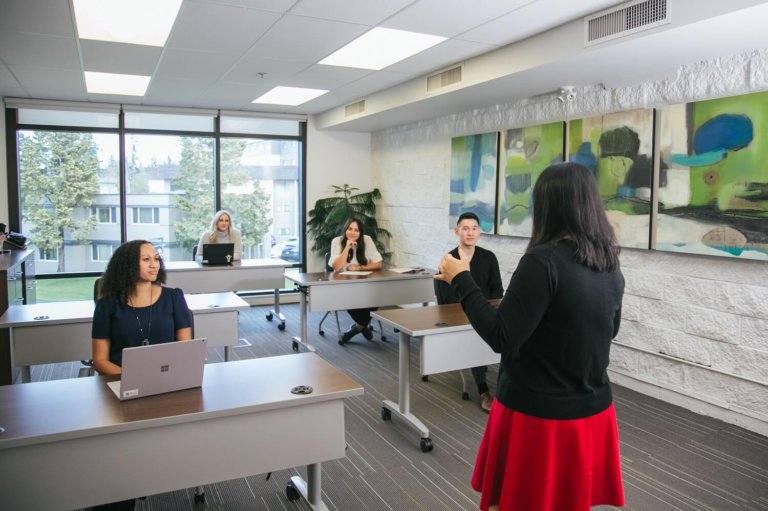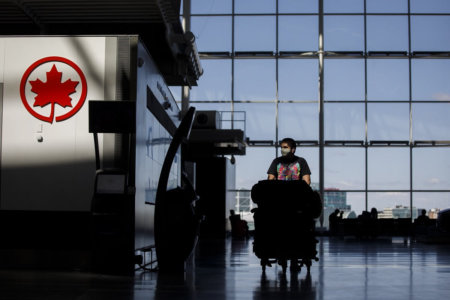
Amanda Birkenstock, a BA in Psychology graduate from Trinity Western University, decided to pursue an MBA and is graduating this year. There is nothing particularly outstanding about that statement, except that this year is 2020, where a pandemic disrupted business schools all around the world.
An MBA is known for its experiential nature — internships abroad, networking within and beyond campus, and working on capstone projects with colleagues. With the pandemic shifting many classes online and rendering these face-to-face experiences impossible, what does this cornerstone of postgraduate business education look like in 2020?
For this 28-year-old, it was an agile and smooth transition to adapt to the disruptions of the virus crisis, thanks to the way her uni designed and organised its asynchronous and synchronous online classes.
“I was recently in a class where a typical day began with two hours of live lecturing, followed by two hours of live discussion in small groups, followed by a chance to meet professors as a group one-on-one, followed by two hours of live lecturing again, and back to two hours of live discussion in small groups,” Birkenstock tells us. The days end with students asynchronously watching lectures and videos on their own. It’s a highly rewarding day, with various forms of support provided.
Her university has also created more student-led clubs where students are able to network with classmates, professors and external parties. These practical opportunities let MBA students here apply what they learn in class to the real world, which is constantly on the change. Find out more below on what Birkenstock has to say about her MBA’s shift to the virtual world:
Why did you choose to study an MBA at Trinity Western University?
I chose to study for my MBA here because of the wealth of cultural, political, and geographical knowledge that is represented in the student and faculty body. I also appreciate the small classroom sizes and the high quality of teaching.
Describe how a typical lesson in this programme usually goes.
It is a hybrid of professors lecturing, case discussions, and student presentations. Due to the small classroom sizes, we are able to ask questions and dive into topics that we are interested in during class.
Due to the COVID-19 pandemic, Trinity Western University has shifted all classes online. Can you tell us more about what you like most about online learning?
TWU has moved our courses online which has allowed me to stay on track for graduation. I appreciate the variety in online teaching styles adopted by our professors — either synchronous, asynchronous, or a hybrid of both.
What has been most challenging about having classes online compared to physical classes on campus? How did you overcome these challenges?
One of the challenges is not being able to see our professors and classmates in person. The MBA department has been intentional in building a community during the pandemic and has created study room sessions and set office hours aside for us to join and stay connected.

Although it’s a challenge not being able to physically meet with professors, Birkenstock has found the asynchronous and synchronous classes very helpful. Source: Amanda Birkenstock
What has been your most memorable online class thus far? Why? Describe it to us in detail.
I took Operations Management and Professor Mark McKay kept it very interactive, even though he was imparting extensive information over two weekends. This course was taught synchronously, not pre-recorded.
At one point, he made us play hangman so we could guess the company that he wanted us to discuss in class. Through this, he was able to keep us engaged and his sense of humour was something I deeply appreciated.
How do your professors and university staff communicate and provide support to you virtually?
The professors here are very enthusiastic about being available for students on a regular basis. For example, when I had a question about a homework assignment, the professor replied to me very promptly via email to helpfully guide me in the right direction as I wrote my research paper for the course.
Tell us more about your plans after graduating. Do you think Trinity Western University’s MBA is helping you achieve these goals?
The MBA programme has definitely shaped me to be a better leader. Since I work full-time while studying, I find I am able to apply what I learn in class one day to my workplace, and the next.

With all classes moving online so graduation can go ahead as planned, Birkenstock appreciates how Trinity Western University has adapted during COVID-19. Source: Amanda Birkenstock
It has stirred up an entrepreneurial spirit in me. One of my goals after graduating is to apply what I have learned to open up a business in the Vancouver area that brings people together in a city known for loneliness.










